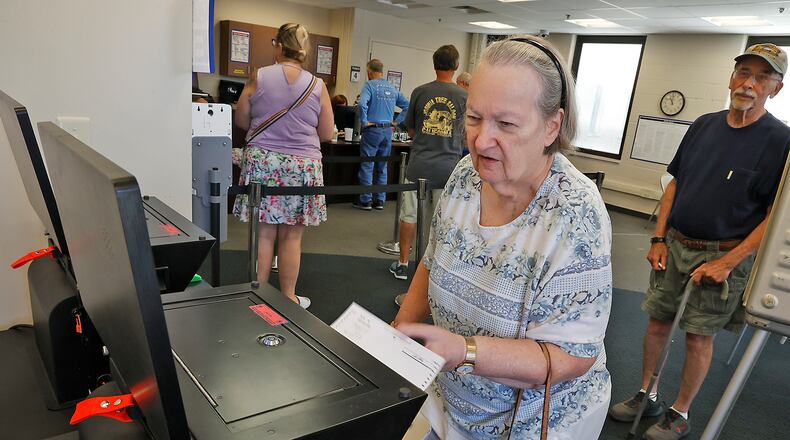Precinct polling locations are open today from 6:30 a.m. to 7:30 p.m. Confirm your polling location at VoterLookup.OhioSoS.gov.
Voters who do not have an ID can vote provisionally. This process has a four-day cure period to prove identification with a photo ID.
Voter turnout
Chris Creamer, Champaign County Board of Elections (BOE) deputy director, said there were 2,931 early voters, which ”is a gigantic kick in the pants” for the county. Despite such a large turnout, the BOE did not experience long voting lines like some other counties, he said.
Clark County had 7,793 early voters and has ordered enough ballots for a 60% turnout, because Jason Baker, Clark County Board of Elections director, said he doesn’t know what to expect Tuesday. He said the BOE can print more ballots on site if necessary.
Creamer said he expects a 20-25% voter turnout, which is a huge increase from a typical 8-10% for August special elections.
Champaign County has had a “very bearable challenge” of getting enough poll workers, relying on a group of “seasoned veterans” to help out, Creamer said.
Clark County experienced a “couple holes” in staffing poll workers with vacations, but the BOE has trained some new people to help, Baker said.
Voter ID
With a change in voter identification laws, both counties are also emphasizing the importance of coming to vote with a valid form of voter ID.
Baker said voters can no longer use items like utility bills or bank statements as IDs to vote.
“The only thing I can’t stress enough is to make sure they have a photo ID,” Baker said.
Valid forms of identification include a non-expired Ohio driver license or a U.S. passport; invalid forms of identification include out-of-state driver licenses and social security cards. The complete list can be found at the Secretary of State website.
What is Issue 1?
If passed, Issue 1 would make it harder to amend the state’s constitution by, among other changes, requiring any proposed state constitutional amendment receive approval from at least 60% of voters instead of the current simple majority requirement in place for more than a century.
It would also require that citizen-initiated petitions receive a number of signatures equal to 5% of the voters in the most recent gubernatorial election in all 88 Ohio counties in order to get on the ballot. Currently, petitioners only need to hit that quota in 44 Ohio counties.
The issue also seeks to remove the 10-day “cure period” that allows petitioners to collect additional signatures after filing their petition with the Ohio Secretary of State.
A “Yes” vote on Issue 1 approves all of the proposed changes, while a “No” vote denies them. Issue 1 needs a simple majority of voters to approve it for it to pass.
Surprising turnout
Creamer said he initially thought the early voting turnout would be low like past special elections, and he has now been proven wrong.
“I’m very surprised at the turnout, and I hope it holds into November,” Creamer said. “I think it will.”
Issue 1 precedes the Nov. 7 election, which is expected to feature an abortion-rights amendment.
Credit: Bill Lackey
Credit: Bill Lackey
About the Author

